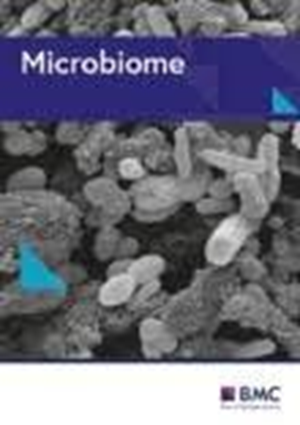不同品种绵羊在不同生育期的瘤胃微生物群和代谢物的演替及其对后代羔羊生长发育的影响
IF 12.7
1区 生物学
Q1 MICROBIOLOGY
引用次数: 0
摘要
雌性动物在不同繁殖期胃肠道中的微生物群和代谢物对其自身及其后代的生长、发育和健康非常重要。然而,不同品种绵羊在整个繁殖期胃肠道微生物群和代谢物的变化及其对后代羔羊生长发育的影响仍不清楚。因此,本研究评估了胡羊和萨福克母羊在不同繁殖期的生殖激素水平、免疫水平、瘤胃微生物群和代谢物,以及它们对后代羔羊生长发育的影响。以胡羊和萨福克母羊非妊娠期、妊娠期和哺乳期为研究对象,测定不同时期母羊的生殖和免疫指标,分析瘤胃微生物组和代谢组,追踪子代羔羊的生长性能和发育状况。结果表明,胡羊和萨福克羊的生殖激素和免疫水平在不同生育期发生了适应性变化。与非妊娠期相比,胡羊妊娠期微生物能量代谢和脂质代谢功能下降,哺乳期能量代谢功能下降。萨福克羊妊娠期能量代谢、糖类生物合成和代谢功能增强,哺乳期辅因子和维生素代谢增强。萨福克羔羊在妊娠期和哺乳期前驱菌增多(P < 0.05),并与羔羊的出生体重和体型呈正相关(P < 0.05)。此外,妊娠期布氏痢疾杆菌和Rikenellaceae_RC9_gut_group的丰度与后代羔羊的肠道免疫力呈正相关(P < 0.05),从而调节了羔羊的肠道免疫水平。代谢组学分析表明,妊娠期胡羊对蛋白质的消化、吸收和氨基酸代谢增强,为妊娠母羊和胎儿的生长发育提供了氨基酸,并与羔羊的出生体重、体型和肠道免疫力显著相关(P < 0.05)。同时,在胡羊和萨福克羊的妊娠期和哺乳期,乙酸盐和丙酸盐都会增加,为母羊的繁殖期提供能量。此外,泌乳期微生物群与牛奶质量和羔羊日增重显著相关(P < 0.05)。该研究揭示了不同繁殖期绵羊瘤胃微生物群及其代谢产物的继代变化特征,以及它们对生殖激素和免疫水平的调控,并确定了它们对后代羔羊生长发育的潜在影响。这些发现为不同绵羊品种在繁殖期的健康和饲养管理提供了有价值的见解。本文章由计算机程序翻译,如有差异,请以英文原文为准。
Succession of rumen microbiota and metabolites across different reproductive periods in different sheep breeds and their impact on the growth and development of offspring lambs
The microbiota and metabolites in the gastrointestinal tracts of female animals at different reproductive periods are very important to the growth, development, and health of themselves and their offspring. However, the changes in the gastrointestinal microbiota and metabolites throughout reproductive period of different sheep breeds and their effects on the growth and development of offspring lambs are still unclear. Hence, this study presents an assessment of the reproductive hormone levels, immune levels, rumen microbiota, and metabolites in Hu sheep and Suffolk ewes at different reproductive periods and their effects on the growth and development of offspring lambs. Hu sheep and Suffolk during non-pregnancy, pregnancy, and lactation were used as the research objects to determine reproductive and immune indexes of ewes at different periods, analyze rumen microbiome and metabolome, and track the growth performance and development of offspring lambs. The results showed that the reproductive hormone and immune levels of Hu sheep and Suffolk underwent adaptive changes across different reproductive periods. Compared with non-pregnancy, the microbial energy metabolism and lipid metabolism function decreased during Hu sheep pregnancy, and energy metabolism function decreased during lactation. In Suffolk, energy metabolism, glycan biosynthesis, and metabolism function were enhanced during pregnancy, and the metabolism of cofactors and vitamins was enhanced during lactation. Prevotella increased in Suffolk during pregnancy and lactation (P < 0.05) and was positively correlated with the birth weight and body size of the lambs (P < 0.05). Moreover, the abundances of Butyrivibrio and Rikenellaceae_RC9_gut_group during pregnancy were positively correlated with the intestinal immunity of the offspring lambs (P < 0.05), thereby regulating the intestinal immunity level of the lambs. Metabolomic analysis revealed that the protein digestion, absorption, and amino acid metabolism of Hu sheep were enhanced during pregnancy, which provided amino acids for the growth and development of pregnant ewes and fetuses and was significantly correlated with the birth weight, body size, and intestinal immunity of lambs (P < 0.05). Simultaneously, there was an increase in acetate and propionate during the pregnancy and lactation period of both Hu sheep and Suffolk, providing energy for ewes during reproductive period. Moreover, the microbiota during the lactation period was significantly correlated with the milk quality and lambs daily gain (P < 0.05). This study revealed the characteristic succession changes in the rumen microbiota and its metabolites at different reproductive periods in sheep breeds and their regulation of reproductive hormone and immune levels and identified their potential effects on the growth and development of offspring lambs. The findings provide valuable insights into the health and feeding management of different sheep breeds during the reproductive stage.
求助全文
通过发布文献求助,成功后即可免费获取论文全文。
去求助
来源期刊

Microbiome
MICROBIOLOGY-
CiteScore
21.90
自引率
2.60%
发文量
198
审稿时长
4 weeks
期刊介绍:
Microbiome is a journal that focuses on studies of microbiomes in humans, animals, plants, and the environment. It covers both natural and manipulated microbiomes, such as those in agriculture. The journal is interested in research that uses meta-omics approaches or novel bioinformatics tools and emphasizes the community/host interaction and structure-function relationship within the microbiome. Studies that go beyond descriptive omics surveys and include experimental or theoretical approaches will be considered for publication. The journal also encourages research that establishes cause and effect relationships and supports proposed microbiome functions. However, studies of individual microbial isolates/species without exploring their impact on the host or the complex microbiome structures and functions will not be considered for publication. Microbiome is indexed in BIOSIS, Current Contents, DOAJ, Embase, MEDLINE, PubMed, PubMed Central, and Science Citations Index Expanded.
 求助内容:
求助内容: 应助结果提醒方式:
应助结果提醒方式:


